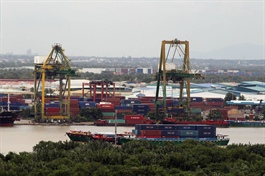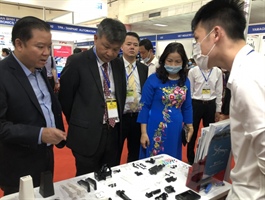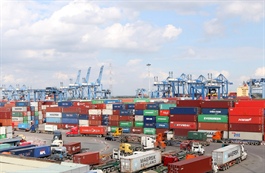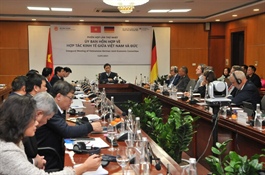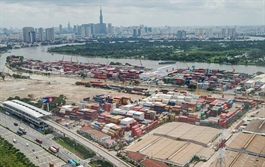Agricultural exports set to join more global value chains as new FTAs take effect
Agricultural exports set to join more global value chains as new FTAs take effect
Vietnamese farm produce exporters are expected to benefit from increased participation in global value chains as a result of the Regional Comprehensive Economic Partnership (RCEP) and the UK-Viet Nam Free Trade Agreement (UKVFTA), speakers said on Friday at a conference in HCM City.

Nguyen Huu Nam, deputy director of the Viet Nam Chamber of Commerce and Industry (VCCI) in HCM City, said that the RCEP would provide Vietnamese farm produce with better access to a larger market and help agricultural businesses improve competitiveness, resulting in more participation in global value chains.
The RCEP, the world’s largest trade pact, which includes the 10 ASEAN-member countries in addition to Australia, China, Japan, New Zealand, and South Korea, will remove or reduce tariffs and facilitate foreign investment.
These countries account for 29 per cent of the world’s GDP and have a total population of 2.2 billion.
The trade pact is set to increase Viet Nam’s exports since many of the other members have high demand for Vietnamese farm produce and processed foods.
It will also open new opportunities for trade with China and other developed countries in new categories such as communications, financial services, logistics, and e-commerce.
The RCEP establishes a common rule of origin framework, allowing exporters in RCEP economies to use inputs sourced from other members to qualify for preferential access when trading in the bloc.
Nguyen Phuc Nguyen, general secretary of the Vietnam Fruit and Vegetable Association, said the trade deal would increase local agricultural exports to China, a major export market for farm produce from Viet Nam.
However, the RCEP could cause competitive pressures on Viet Nam’s agricultural products.
“The quality and value-added content of most of our exports remain modest,” he said.
Vietnamese exporters must take this opportunity to improve their products and supply chains, he noted.
Under the RCEP, Viet Nam and its partners will remove tariffs on at least 64 per cent of tariff lines.
Within 15 to 20 years, Viet Nam will have removed 89.6 per cent of tariff lines for partner countries which, in return, will have removed up to 92 per cent of tariff lines for Viet Nam. Other ASEAN members will remove 85.9 per cent of all tariffs for Viet Nam.
Nguyen Anh Dung, manager of the Agro Processing and Market Development Authority, said China was Viet Nam’s largest export market for farm produce and accounted for more than 25 per cent of total farm produce exports from Viet Nam.
Exports of farm produce to China rose from $3.3 billion in 2010 to $10.9 billion in 2019. Last year, exports to the market reached $10.36 billion, a drop of 5.2 per cent over 2019, he said.
Last year, Viet Nam’s total exports of farm produce reached $41.2 billion, a rise of 2.6 per cent over 2019, according to Dung.
UKVFTA benefits
Nam, deputy director of VCCI HCM City, said that under the UK – Viet Nam Free Trade Agreement (UKVFTA) Viet Nam must improve product quality and ensure uniformity of products to enter the UK market successfully.
Since the UK’s demand is increasing for agricultural products, food, electronic products, personal protective equipment and laboratory equipment, the trade pact will help Viet Nam increase exports to the market.
The UKVFTA, signed in December 2020, was negotiated based on commitments previously made in the EVFTA (EU-VN trade agreement), with necessary adjustments to ensure compliance with the bilateral trade framework between Viet Nam and the UK and to ensure a balance of benefits between the two countries.
The signing of the UKVFTA will ensure that bilateral trade will not be interrupted in the post-Brexit period.
Basically, the content of UKVFTA is similar to the EVFTA, including regulations on rules of origin, customs and trade facilitation, sanitary and phytosanitary rules, non-tariff trade barriers, competition policy, State-owned enterprises, Government procurement, intellectual property, cooperation and capacity building, and transparency, among others.
Under the RCEP, Viet Nam will have more opportunities to promote exports to the UK thanks to commitments related to the opening of the market for goods, coupled with additional quotas on products in which Viet Nam has high competitive advantages such as agricultural and fishery products.
The UK is the third largest trade partner of Viet Nam in Europe. According to the General Department of Customs, bilateral trade reached $6.6 billion in 2019, in which Viet Nam’s exports to the UK accounted for nearly 88 per cent.







